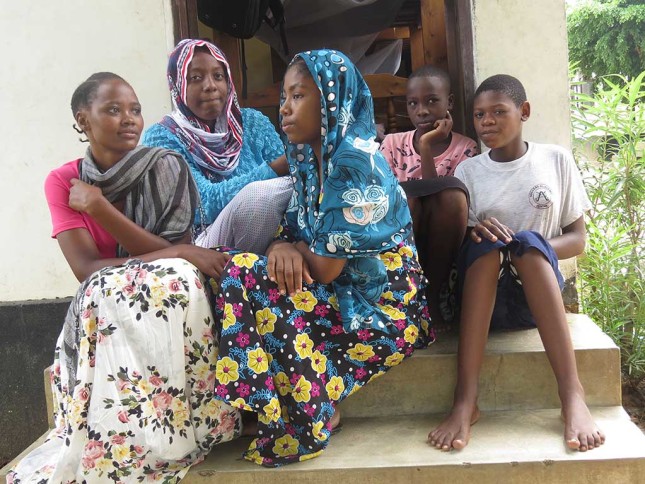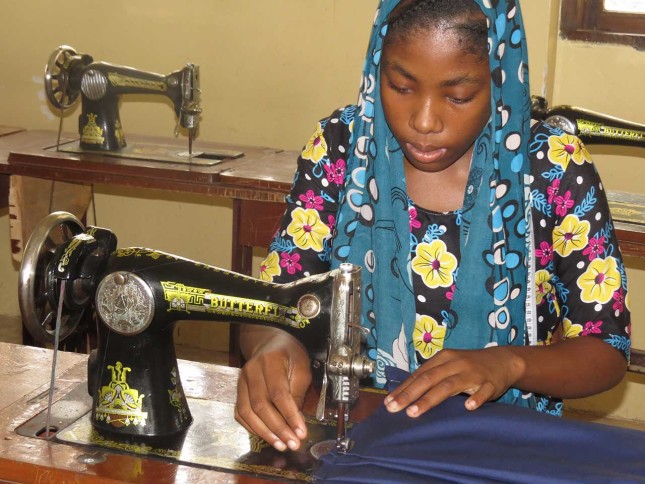-
COVID-19 Adds to Challenges of Curbing Child Marriage
January 27, 2021 By Carol Guensburg
When Mwanahamisi Abdallah’s mother announced plans to marry her off to a stranger, the 14-year-old Tanzanian girl burst into tears. She had no desire to marry—especially after learning the man already had three wives. Remembering advice from a teacher, she phoned authorities to intervene. They blocked the wedding and eventually delivered Mwanahamisi from her village in southeastern Lindi region to a girls’ shelter in Dar es Salaam.
Mwanahamisi was one of the lucky few who escaped an unwanted early union, unlike others featured in Voice of America’s (VOA) multimedia project, “The Worth of a Girl.” This project examined the social and economic costs of child marriage, focusing on 16 women and girls in a dozen countries, including the United States, to illustrate how unions before age 18 affect individuals, their families, and countries. The United Nations aims to eliminate the practice by 2030, a move that UNICEF says is key to improving global health, ending poverty, and advancing gender equality and human rights.
The prevalence of early marriage—which is highest in sub-Saharan Africa and South Asia—had been declining globally, from one in four girls married a decade ago down to one in five today.
Then COVID-19 surfaced in December 2019, several months after the release of “The Worth of a Girl.” As Save the Children warned in September 2020, the deadly pandemic and resulting economic strife are fueling child marriages, likely reversing 25 years of progress. The organization projected that an additional 500,000 girls were at risk of early marriage in 2020, on top of the roughly 12 million new unions already occurring worldwide each year.
How many could avoid an early marriage as Mwanahamisi did?
Factors Behind Early Marriage
Child marriage has multiple drivers—tradition, poverty, pregnancy, inadequate education, insecurity and gender inequality—according to Girls Not Brides, a global partnership of more than 1,500 civil society groups. Too often, it says, girls are considered a drain on a family’s finances or a commodity to be traded.
The women interviewed for “Worth of a Girl” bore witness to those findings. Some were steered into wedlock by religious or cultural custom; others by a family’s desire to protect and provide for a girl, to build alliances or to get a good bride price for virginity. Though some women said they had built stable unions, embraced motherhood, and made satisfying lives, others suffered adverse health from giving birth while their own bodies still were developing. Still others endured servitude, verbal abuse, and domestic violence.
Almost all regretted that early marriage had cut off their formal schooling and their potential.
It also leads to major negative impacts for poverty reduction and for economic growth, World Bank Economist Quentin Wodon told VOA. He co-authored a 2017 report that calculated the economic toll of early marriage in 25 developing countries. It found that halting a girl’s education limited her lifetime earning potential and constrained her country’s productivity.
The study argued for girls’ education, finding that for every year of secondary school, the likelihood of early marriage falls by at least 5 percentage points.
But lockdowns intended to curb coronavirus have also slashed tuition-supporting incomes and closed schools. In confinement, some youths engaged in sex by choice or coercion, leading to pregnancy and sometimes early marriage.

Adjusting Strategies
But the pandemic has complicated such efforts, too.
“With COVID-19, we have had to change sometimes our approaches to make people safe,” said Ramatou Kane, who leads program development for the aid group Plan International in Niger, home to the world’s highest prevalence of early marriage. Three-fourths of the West African country’s girls marry by 18.
Some funds intended for training, such as to empower girls, have been diverted to more urgent health and hygiene needs, Kane said. Girls switched from learning tailoring to sewing masks. Boys participating in the Future Husbands Club were charged with maintaining community handwashing facilities.
The combination of COVID-19 and militant extremists’ activity in the Sahel region means cases of child marriage will increase, Kane predicted. Through marriage, some parents believe they are building alliances between families and improving their child’s safety. “Parents think they’re protecting their daughters.”
Some families seem to accept aid workers’ messaging against child marriage, she said, but proceed with a wedding when aid workers are gone—unless a religious leader refuses to officiate.
Enlisting Traditional Leaders
Recognition of religious leaders’ influence, including in addressing harmful practices, led to the launch of the African Union’s Council of Traditional Leaders in Africa (COTLA) in 2019.
“They have a lot to do with the cultural practices, religious beliefs,” said Jane Marie Ong’olo, who heads the African Union Commission’s division of social welfare. “We brought them at the highest levels to work with their communities, to advocate, and begin to bring changes.”
In 2014, the African Union launched a campaign to end child marriage, extending it to at least 2023 because of “the enormity of the problem,” Ong’olo said, noting African leaders’ strong support for the initiative.
But COVID-19 is undermining progress, she said. Though schools shuttered in the pandemic are beginning to reopen, many are compressing curricula to make up for lost time—and that could discourage students from returning to or staying in classes.
“Children have different coping strategies, and as hormones also catch up with them, some might feel they don’t need school anymore,” Ong’olo said. Keeping them in school, she added, “is the best social protection measure as far as I see.”
Mwanahamisi, the young Tanzanian who sought help to avoid marriage, found counseling, support, and vocational training at a Dar es Salaam center run by Kiota Women Health and Development Organization (KIWOHEDE). The NGO assists disadvantaged teenage girls, many of whom are fleeing forced marriage. With an optimum capacity for 150 girls, it currently serves 250, said its Executive Director Justa K. Mwaituka.
When Mwanahamisi was interviewed at the center over two years ago, she was training in fabric arts. “My dream is to become a great fashion designer,” she told VOA. Now she has earned a certificate in tailoring and developed a business plan, guided by KIWOHEDE and her uncle.
Mwanahamisi has made peace with her mother, said Mwaituka, but remains with KIWOHEDE. Almost 18, she also remains unmarried.
Carol Guensburg is an editor with Voice of America’s Africa Division.
Sources: Girls Not Brides, KIWOHEDE, Plan International, Save the Children, UNICEF, UN Women, Voice of America, World Bank.
Photo Credit: Mwahanamisi Abdallah, center, poses with other girls at a center run by Kiota Women Health Organization (KIWOHEDE) in Dar es Salaam, Tanzania, used with permission courtesy of Faraia Filbert Dogeje/VOA News; With help from KIWOHEDE, Mwanahamisi Abdallah has a tailoring certificate and a business plan, used with permission courtesy of Faraia Filbert Dogeje/VOA News.
Topics: Africa in Transition, Dot-Mom, GBV, gender, global health, Guest Contributor, human rights, population
 A Publication of the Stimson Center.
A Publication of the Stimson Center.




